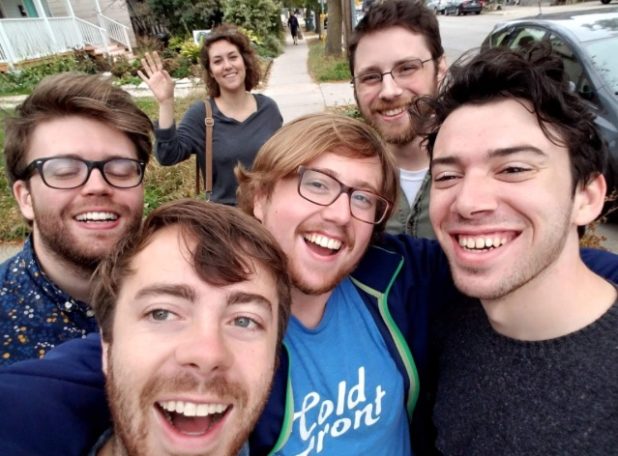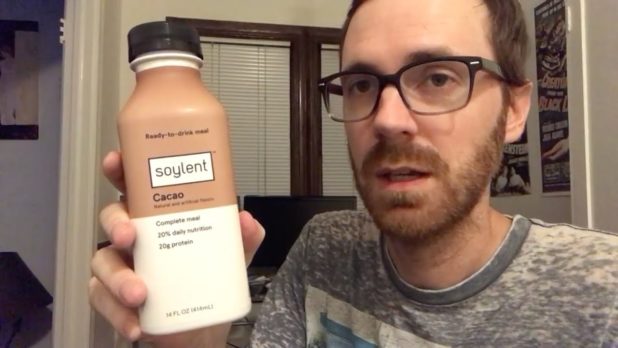Pomidor Quixote
Daily Stormer
December 30, 2019
Dr. James Stangle
This brave hero took a stand against estrogen.
Amid the growing popularity of plant-based products, a doctor of veterinary medicine has suggested that the Burger King’s Impossible Whopper has so much estrogen from soy that it could make men grow breasts.
In a report in Tri-State Livestock News, Dr. James Stangle of South Dakota rails against the alternative burger, made by Impossible Foods, and its use of soy protein as a main ingredient.
Strangle compares the soy-based Impossible Whopper to the beef Whopper, claiming that the plant-based version has 44 milligrams of estrogen while the original only contains 2.5 nanograms.
‘Now let me refresh your metric system. There are 1 million nanograms (ng) in one milligram (mg). That means an impossible whopper has 18 million times as much estrogen as a regular whopper,’ he writes.
‘Just six glasses of soy milk per day has enough estrogen to grow boobs on a male. That’s the equivalent of eating four impossible whoppers per day. You would have to eat 880 pounds of beef from an implanted steer [cattle that is raised for beef] to equal the amount of estrogen in one birth control pill.’
Despite Stangle’s claims, there has been little evidence that has definitively proven these claims.
Conservative outlets like MichaelSavage.com and National File have also perpetuated these claims, with Tom Pappert, editor in chief of the National File, backing up the allegations.
‘In short, the Impossible Burger is a genetically modified organism filled with calorie-dense oils that can make a man grow breasts if eaten in sufficient quantity,’ he wrote.
…
Stangler’s latest critique of soy-based food is just one in a long line of arguments against the mock meat industry and their products.
The Environmental Health Perspectives report that soy contain a high concentration of isoflavones, which ‘belong to a class of compounds generally known as phytoestrogens.’
These plant compounds are thought to be ‘similar in function to human estrogen but with much weaker effects.’
New York University nutrition professor Marion Nestle told the Washington Post that the apprehension surrounding soy has been an ongoing point of debate.
Nestle recalls reviewing a plethora of research material for her 2006 book, ‘What to Eat.’
One all but said ‘soy is poison,’ while another resource maintains that, ‘soy is the best health food ever.’
‘Whether this is good, bad or indifferent depends entirely on who you read and what you read. There is an enormous, enormous, enormous amount of literature on soy estrogens, and it comes to sort of baffling conclusions,’ she said.
‘Some studies show harm, some studies show benefits. What do you do in a situation like that?’
What do you do in a situation like that?
How about trusting your eyes and your gut?
People nowadays look weird.
Men look feminine and women look masculine.
Testosterone levels in men are lower today than they were in previous generations.
When considering possible causes, it is important to remember that soy consumption is the highest it has ever been. Some form of soy can be found in almost every food sold at the supermarket.
I’m not putting all the blame on soy here, but given its dietary ubiquity, it is one important factor to consider when trying to pinpoint what exactly is messing with people’s endocrine systems.
According to Nestle, the best thing to do is look at cultures who have historically consumed soy products.
She said: ‘Asians have been eating soy products for millennia and don’t seem to be any the worse for it. They have among the longest lifespans and best health, at least in classic diets.’
‘There is a special concern about . . . men and boys who eat soy products, but again, if you look at populations that eat a lot of soy products, there is no evidence of particular problems. No, they don’t grow breasts.’
The soy foods that Asians consume are mostly fermented forms of soy. They don’t have a millennia-long history of eating soy burgers and drinking soy milk.
In the West, the soy craze has reached such levels of insanity that you can find soy “milk” beverages made mostly from powdered soy beans in health food stores.
There are YouTube videos showing people making this “milk” by literally blending soy beans with water and then straining the result.
It is absolute madness.
Soy products like soy-based infant formulas, which had become popular with parents, cause the most unease.
The National Institute of Environmental Health acknowledges that despite there being no documented health concerns, infants are entering developmental stages.
‘It is recognized that infants go through developmental stages that are sensitive to estrogens. Therefore, infants are more likely than adults to be vulnerable to the estrogen-like effects of the phytoestrogens in soy,’ they said.
Giving soy — in any of its forms — to babies should be illegal. We know that soy formula causes menstrual problems for women later in life and that babies fed with infant formula instead of breast milk are more likely to become obese later in life.
Human babies are meant to drink their mother’s milk.
In animal studies, soy product has indicated, ‘that health effects of possible concern include early onset of puberty in females and alterations in development of breast tissue.’
However, the Harvard Public School of Health warns that these studies should not be the basis of an individual’s decision.
‘Soy may be metabolized differently in animals, so the outcomes of animal studies may not be applicable to humans,’ they say.
They also assert that soy ‘may be broken down and used by the body differently in different ethnic groups, which is why individuals from some countries who eat a lot of soy appear to benefit from the food.’
The age of the first menstrual cycle has been declining for some time now.
We can look at all of these things as big coincidences and continue to eat food products poisoned with soy, or we can remove this absolutely unnecessary legume from our lives and save ourselves the trouble of navigating through the controversy.
 Daily Stormer The Most Censored Publication in History
Daily Stormer The Most Censored Publication in History













